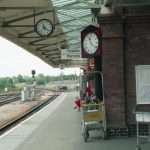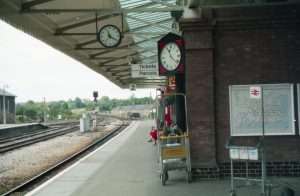A psychological need for trains
In the early 1980s, British Rail produced entire softback books of railway timetables for various regions of the network. The timetable books were free. Piles of them would be set out in booking offices at stations. Despite only using two of Southern Region’s hundreds of services, (and those were from different termini, Waterloo to Yeovil Junction and Victoria to Brighton), the timetable for South West London, West Surrey, Hampshire, the Isle of Wight and Dorset always made interesting reading.
The places were unknown to me, the trains would never be caught; the appeal lay in thinking of such a level of activity. Habitually arriving at Waterloo station long before a train was due to be caught, there was a delight in sitting and watching the mechanical departure board announcing the trains listed in the timetable book. There was little detail to add to the times of most of the services, things like dining cars are not plentiful when trains were often at their destination in an hour. Few of the Southern Region trains offered much by way of excitement, electric or diesel multiple units; no locomotives bearing brass name plates that gave them an individual identity.
The nature of the trains did not matter, their presence did. Scanning the columns of the timetables; there was a wealth of fascinating information. There were trains early in the mornings and late at night which exercised the imagination as to who might travel on such services. Where would people be going before six o’clock in the morning or after midnight? Did the same people travel at such hours? Was there a community of nocturnal people? Did they nod in recognition to each other? Did those journeying in the early hours bid “good morning” to others in the carriage? Anyone realizing that the young man staring fixedly at the departure boards was making imaginary journeys might have given him a wide berth.
Southern Region was always particularly attractive because their trains often went no further than the suburbs. They travelled within the world of streetlights; they travelled on lines through areas so populous that the trains stopped every few minutes. The world of the Southern Region was a world filled with people and buildings, and businesses and buses, and trains rattling through the night.
When someone said to me last week that they needed to live in the city, that they needed the buzz and the bustle, I think I understood. Perhaps they would have understood my fascination with a British Rail timetable book.



I think we all have that requirement for something that isn’t really noticed until it’s missing. For me it’s mountains. I never knew I had a thing about them until I lived in London and delighted in getting to Wales for there is the first place you encounter what we call mountains.
I worked with a fella who grew up in Ireland (one of yours) who never felt relaxed until he was home in the Vale of the White Horse( was B, now O, but at heart still B-shire). An area to me that was filled with rather blagh rolling hills and Betjeman.